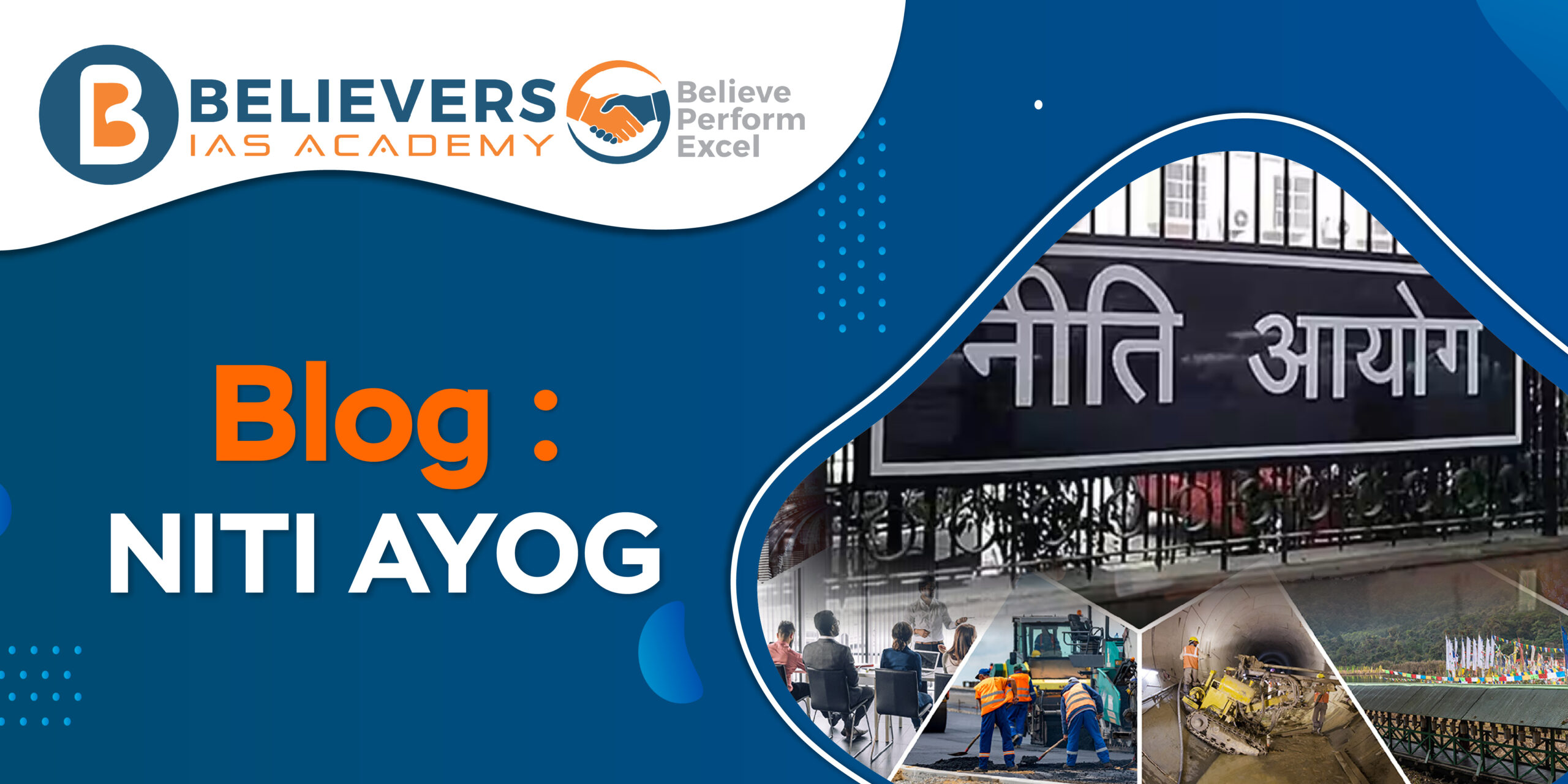Blog :Niti Ayog
The National Institution for Transforming India, or NITI Aayog, is a government of India policy think tank and advisory agency. On January 1st of 2015, it was founded to take the role of the Planning Commission. India’s sustainable development and economic growth strategies are developed and put into action on the NITI Aayog platform.
How did it come into existence?
- Legacy of the Planning Commission: The 1950 establishment of the Planning Commission resulted in around six decades of operation. It used a centralized, command-and-control style of planning that was highly influenced by socialist USSR ideology.
- Plans for the next five years: The Planning Commission created five-year plans that outlined objectives and allotted funds to various economic sectors. It was essential in determining the direction of India’s economic and development policies.
- Criticisms faced over time: The Planning Commission has come under fire for its inflexible approach, which some have claimed prevents innovation, economic progress, and efficient governance. It was believed that the top-down planning approach stifled initiative and decision-making at lower levels.
- Replacement with NITI Aayog: On January 1, 2015, the Indian government replaced the Planning Commission with NITI Aayog to address its flaws and foster a more inclusive approach.
- Emphasis on the “Bottom-Up” approach: NITI Aayog supported the participation of states and union territories in the decision-making process by introducing a move towards a “Bottom-Up” approach to planning. This strategy attempted to strengthen local governments and advance cooperative federalism.
- “Maximum Governance, Minimum Government: It emphasizes efficient governance and lessens the role of the federal government, giving states and local governments more autonomy and control over policy.
- Strategic Policy Formulation: Formulating long-term, strategic policies for diverse economic sectors is the responsibility of NITI Aayog. Research is done, issues and possibilities are analyzed, and pertinent advice is given to the federal and state governments.
- Monitoring and evaluation: To ensure accountability and effectiveness, NITI Aayog keeps an eye on and assesses how policies and initiatives are being put into practice. It evaluates the strides taken toward accomplishing goals and recommends adjustments that are required.
- Foster Cooperative Federalism: Cooperative federalism is encouraged by NITI Aayog, which makes it easier for the federal government, state governments, and union territories to work together and coordinate their efforts. It acts as a forum for discussion and teamwork.
- Innovation and entrepreneurship: NITI Aayog seeks to promote innovation and entrepreneurship through promoting fresh concepts, the use of technology, and involvement from the private sector. It acknowledges the significance of innovation in promoting economic development and growth.
Who are the members of Niti Ayog?
- Chairperson: The Prime Minister of India serves as the NITI Aayog’s chair. The Prime Minister, who serves as the organization’s leader, directs strategy and keeps an eye on NITI Aayog’s operations.
- Vice-Chairperson: The Prime Minister appoints the Vice-Chairperson of NITI Aayog. In addition to assisting the Chairperson, the Vice-Chairperson is crucial in developing and carrying out policies and initiatives.
- Governing Council: The Chief Ministers of all Indian states and the Lt. Governors of Union Territories make up the governing council. This council serves as a forum for discussion, cooperation, and decision-making on numerous developmental concerns while representing the interests of the states and Union Territories.
- Regional Council: The Regional Council was created to deal with particular regional challenges. The Prime Minister or a representative of him serves as its chairman, and its members are Chief Ministers and Lt. Governors. The Regional Council is responsible for identifying and resolving issues unique to the region and developing effective policies and initiatives.
- Adhoc Membership: Two ex-officio members from top research universities make up the NITI Aayog. These individuals are chosen on a rotating basis from eminent Indian research institutions. They contribute to the development of evidence-based policy by bringing their research knowledge and insights to NITI Aayog’s activities.
- Ex-Officio Membership: Four Union Council of Ministers members can serve as ex-officio members of NITI Aayog. These individuals serve as ex-officio delegates and are proposed by the prime minister. They speak for their respective ministries and offer opinions on issues of policy from those areas.
- Chief Executive Officer: The Prime Minister appoints the Chief Executive Officer (CEO) for a certain term. The CEO is in charge of running the day-to-day affairs of NITI Aayog and has the status of Secretary to the Government of India. To put the organization’s goals and plans into action, the CEO collaborates closely with the Chairperson and Vice-Chairperson.
- Special Invitees: NITI Aayog may invite subject-matter experts and professionals to take part in its operations. These special invitees are nominated by the Prime Minister based on their expertise in relevant fields. They contribute their insights and recommendations on specific policy areas and provide valuable input to NITI Aayog’s work.
What are the 7-pillars of effective governance as visioned by Niti Ayog?
The 7-Pillars visioned by the Niti Ayog are as follows:
- Pro-people: By developing policies and initiatives that focus on the welfare and well-being of the populace, NITI Aayog seeks to satisfy the ambitions and demands of society and individuals.
- Proactivity: NITI Aayog employs a proactive strategy to foresee and address the demands and difficulties that citizens may encounter. It works to create novel approaches and plans that will support both social and economic development.
- Participation: NITI Aayog places a strong emphasis on the participation and engagement of citizens in the formulation of public policy. To support inclusive decision-making, it promotes participation from a range of stakeholders, including civil society organizations, professionals, and individuals.
- Empowering: By fostering an atmosphere that supports women’s social, economic, and political empowerment, NITI Aayog aims to empower all facets of society, particularly women. It strives to lessen gender inequities and advance gender equality.
- Inclusion: All individuals should be included, regardless of their caste, creed, gender, or level of socioeconomic status, according to the NITI Aayog. It attempts to make sure that all facets of society, particularly vulnerable and marginalized groups, benefit from development.
- Equality: Equal opportunity for all people, especially the young, is a priority for NITI Aayog to support their growth and enable them to advance the country. It encourages social and economic equality by promoting measures that lessen inequities.
- Transparency: NITI Aayog encourages accountability and openness in government. It strives to increase government visibility, accessibility, and responsiveness to people’s demands and aspirations. It promotes the use of technology and data-driven strategies to improve governance processes’ efficiency and transparency.
What are the objectives of Niti Ayog?
- To evolve a shared vision of national development priorities, sectors and strategies with the active involvement of States.
- To foster cooperative federalism through structured support initiatives and mechanisms with the States continuously, recognizing that strong States make a strong nation.
- To develop mechanisms to formulate credible plans at the village level and aggregate these progressively at higher levels of government.
- To ensure, in areas that are specifically referred to it, that the interests of national security are incorporated in economic strategy and policy.
- To pay special attention to the sections of our society that may be at risk of not benefiting adequately from economic progress.
- To design strategic and long-term policy and programme frameworks and initiatives, and monitor their progress and their efficacy. The lessons learned through monitoring and feedback will be used for making innovative improvements, including necessary mid-course corrections.
- To provide advice and encourage partnerships between key stakeholders and national and international like-minded think tanks, as well as educational and policy research institutions.
- To create a knowledge, innovation and entrepreneurial support system through a collaborative community of national and international experts, practitioners and other partners.
- To offer a platform for the resolution of inter-sectoral and inter departmental issues to accelerate the implementation of the development agenda.
- To maintain a state-of-the-art resource centre, be a repository of research on good governance and best practices in sustainable and equitable development as well as help their dissemination to stakeholders.
- To actively monitor and evaluate the implementation of programmes and initiatives, including the identification of the needed resources to strengthen the probability of success and scope of delivery.
- To focus on technology upgradation and capacity building for implementation of programmes and initiatives.
- To undertake other activities as may be necessary to further the execution of the national development agenda, and the objectives mentioned above.
What are the achievements of Niti Ayog?
The NITI Aayog’s accomplishments include:
- It significantly contributed to the Ayushman Bharat Scheme’s strengthening. It contained in-depth peer appraisals of PMJAY’s health benefits packages.
- It has been leading the World Health Outcome Index in cooperation with the Ministry of Health & Family Welfare (MoHFW) and with technical support from the World Bank.
- With the assistance of district officers working under the direction of district collectors, the Aspirational District Program is promoting change in the health and nutrition sectors.
- The National Commission for Homoeopathy (NCH) Bill, 2018, the National Commission for Indian System of Medicine Bill, 2018, and the National Commission for Yoga & Naturopathy Bill, 2018, were all assessed, and recommendations were made.
- Keeping track of and evaluating food and agricultural policies



